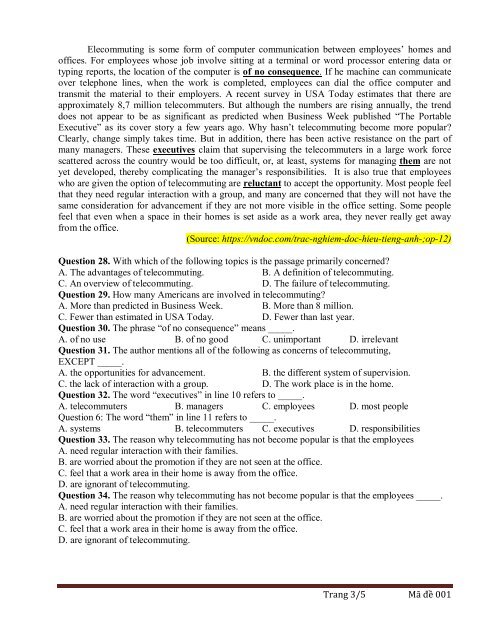12 đề thi thử THPT Quốc gia môn tiếng Anh năm 2018 có lời giải chi tiết
https://app.box.com/s/nnfa5e7e8wjt4ogw5c12nscparzxshyv
https://app.box.com/s/nnfa5e7e8wjt4ogw5c12nscparzxshyv
You also want an ePaper? Increase the reach of your titles
YUMPU automatically turns print PDFs into web optimized ePapers that Google loves.
Elecommuting is some form of computer communication between employees’ homes and<br />
offices. For employees whose job involve sitting at a terminal or word processor entering data or<br />
typing reports, the location of the computer is of no consequence. If he ma<strong>chi</strong>ne can communicate<br />
over telephone lines, when the work is completed, employees can dial the office computer and<br />
transmit the material to their employers. A recent survey in USA Today estimates that there are<br />
approximately 8,7 million telecommuters. But although the numbers are rising annually, the trend<br />
does not appear to be as significant as predicted when Business Week published “The Portable<br />
Executive” as its cover story a few years ago. Why hasn’t telecommuting become more popular?<br />
Clearly, change simply takes time. But in addition, there has been active resistance on the part of<br />
many managers. These executives claim that supervising the telecommuters in a large work force<br />
scattered across the country would be too difficult, or, at least, systems for managing them are not<br />
yet developed, thereby complicating the manager’s responsibilities. It is also true that employees<br />
who are given the option of telecommuting are reluctant to accept the opportunity. Most people feel<br />
that they need regular interaction with a group, and many are concerned that they will not have the<br />
same consideration for advancement if they are not more visible in the office setting. Some people<br />
feel that even when a space in their homes is set aside as a work area, they never really get away<br />
from the office.<br />
(Source: https://vndoc.com/trac-nghiem-doc-hieu-tieng-anh-;op-<strong>12</strong>)<br />
Question 28. With which of the following topics is the passage primarily concerned?<br />
A. The advantages of telecommuting. B. A definition of telecommuting.<br />
C. An overview of telecommuting. D. The failure of telecommuting.<br />
Question 29. How many Americans are involved in telecommuting?<br />
A. More than predicted in Business Week. B. More than 8 million.<br />
C. Fewer than estimated in USA Today. D. Fewer than last year.<br />
Question 30. The phrase “of no consequence” means _____.<br />
A. of no use B. of no good C. unimportant D. irrelevant<br />
Question 31. The author mentions all of the following as concerns of telecommuting,<br />
EXCEPT _____.<br />
A. the opportunities for advancement. B. the different system of supervision.<br />
C. the lack of interaction with a group. D. The work place is in the home.<br />
Question 32. The word “executives” in line 10 refers to _____.<br />
A. telecommuters B. managers C. employees D. most people<br />
Question 6: The word “them” in line 11 refers to _____.<br />
A. systems B. telecommuters C. executives D. responsibilities<br />
Question 33. The reason why telecommuting has not become popular is that the employees<br />
A. need regular interaction with their families.<br />
B. are worried about the promotion if they are not seen at the office.<br />
C. feel that a work area in their home is away from the office.<br />
D. are ignorant of telecommuting.<br />
Question 34. The reason why telecommuting has not become popular is that the employees _____.<br />
A. need regular interaction with their families.<br />
B. are worried about the promotion if they are not seen at the office.<br />
C. feel that a work area in their home is away from the office.<br />
D. are ignorant of telecommuting.<br />
Trang 3/5 Mã <strong>đề</strong> 001

















